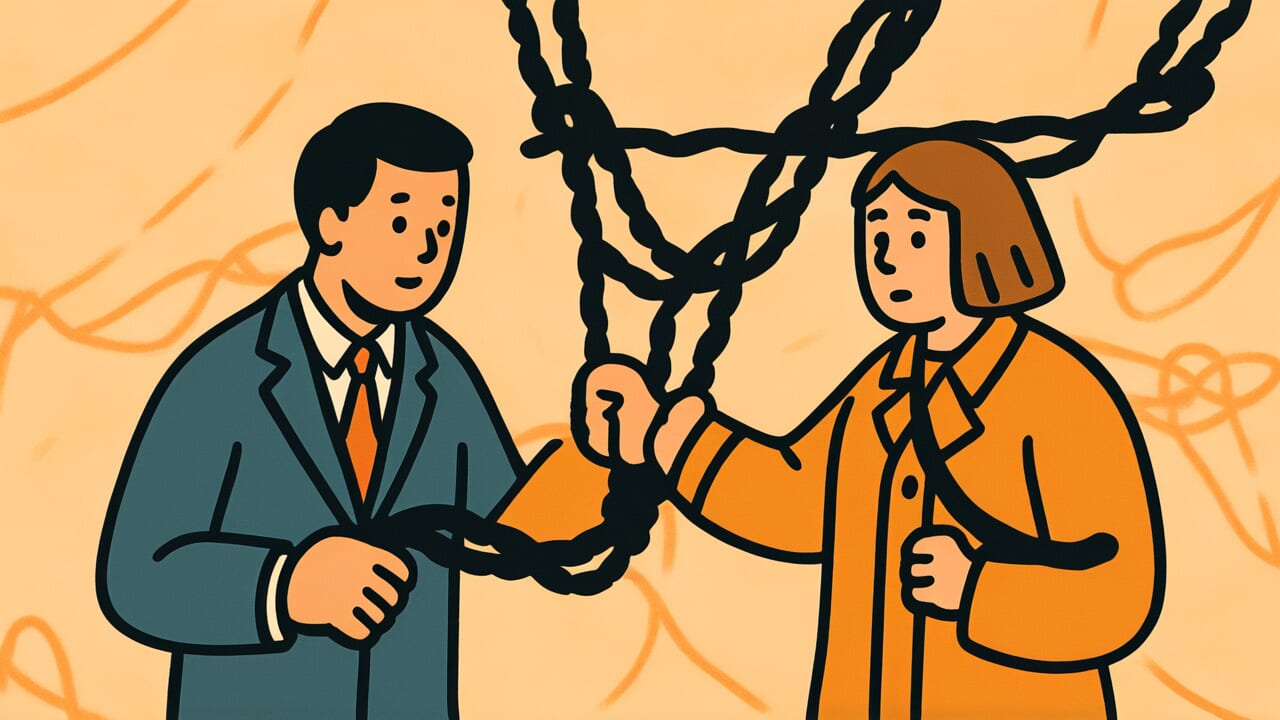How to Read “A rotten bond won’t break”
Kusare-en wa hanarezu
Meaning of “A rotten bond won’t break”
“A rotten bond won’t break” describes the reality that some relationships continue even when you know they’re not good for you. A “rotten bond” refers to a relationship that doesn’t benefit either person. In fact, it may even have negative effects on both sides.
This proverb applies to friendships with bad influences, troublesome acquaintances, or connections that bring more problems than benefits. You know you should keep your distance, but somehow the relationship keeps going.
You might think “I really shouldn’t be involved with this person anymore.” Yet something brings you back together again. Many people have experienced this at some point.
People still use this saying today to express the mystery of human relationships. Your mind knows you should walk away. But emotion, habit, or some unexplainable force keeps the connection alive.
This proverb captures the complexity of human bonds and the strange power of connections.
Origin and Etymology
The term “rotten bond” appears in documents from the Edo period. It has a long history in Japanese language. The word “rotten” might sound quite strong to modern ears.
“Rotten” has traditionally been used to describe something in a bad state. In “rotten bond,” it suggests the relationship is unhealthy or undesirable.
Just as food can rot, Japanese people have long used “rotten” to describe relationships that have gone bad.
The word “bond” reflects Buddhist influence on Japanese thought. It’s a uniquely Japanese concept. People see connections between individuals as more than mere coincidence.
They view bonds as ties created by some invisible force. This concept of “bond” explains why even bad relationships don’t break easily.
“Won’t break” describes a state that happens regardless of your will. You want to cut ties but can’t. You want to leave but somehow stay connected.
This short proverb perfectly captures the mystery and complexity of human relationships.
Interesting Facts
“Rotten bond” isn’t always completely negative. Sometimes people use it with affection. They might say “we have a rotten bond” about a long relationship where both know each other’s flaws.
It expresses a complicated attachment to an imperfect but enduring connection.
The concept of “bonds” runs deep in Japanese culture. Good connections are called “good bonds” and bad ones “bad bonds.” “Rotten bond” sits somewhere in between.
It represents relationships that can’t be simply categorized. This unique expression shows the richness of the Japanese language.
Usage Examples
- That guy and I go back to our school days – a rotten bond won’t break, and he still contacts me sometimes
- My ex and I broke up, but we have so many mutual friends – a rotten bond won’t break, as they say
Universal Wisdom
“A rotten bond won’t break” contains an essential truth about human relationships. We are rational beings, but we’re also emotional and habitual creatures.
Your head might say “this relationship is bad for me.” But your heart or body makes a different judgment.
Why do people continue relationships they know are harmful? Because humans don’t operate on simple cost-benefit calculations alone.
Shared time, accumulated memories, and familiar relationship patterns all matter. These things have power beyond logic.
Psychologically, maintaining an existing relationship feels easier than building a new one. This is true even when problems exist.
This proverb also reveals the depth of the “bond” concept. Connections between people aren’t controlled by will alone.
Social networks, chance meetings, and mutual acquaintances all play a role. Many factors intertwine to keep bonds alive.
Our ancestors condensed this puzzling aspect of relationships into the short phrase “A rotten bond won’t break.” No relationship is perfect. Yet people live within these connections.
This proverb simply observes that reality. It doesn’t express resignation or approval. It shows deep human understanding.
It looks at both human weakness and strength with clear eyes.
When AI Hears This
Rotten bonds persist not because of relationship quality, but because of structure. Network theory explains this well.
The longer a relationship lasts, the more “mutual acquaintances” accumulate. Say you have a rotten bond with Person A.
Through A, you’ve met other friends, frequented certain places together, and created shared memories with others. This creates a web-like network. We call this “high network redundancy.”
The key point is that the cost of breaking the relationship increases exponentially. To cut ties with A, you must explain to ten mutual friends.
Your relationships with those friends become awkward too. Mathematically, to sever one bond, you must actually adjust ten or more relationships.
The energy needed to escape grows by the square or cube of the relationship’s duration.
From an information perspective, rotten bonds provide almost no “new information.” This is called a low-entropy state.
Conversations are predictable and lack surprise. But precisely because they’re predictable, the maintenance cost is low.
New friendships are stimulating but require energy to understand the other person. Rotten bonds are like low-nutrition but easily digestible food.
We unconsciously calculate energy efficiency and end up staying put.
Lessons for Today
This proverb teaches modern people the importance of “conscious choice” in relationships. Rotten bonds may not break easily, but your life changes greatly depending on your awareness.
Do you passively accept them or consciously engage with them?
First, develop a habit of regularly reviewing your relationships. Is this relationship truly necessary for you? Are you continuing it out of inertia?
Asking these questions transforms unconscious choices into conscious ones.
If you decide a relationship truly needs to end, take concrete actions to create physical and psychological distance. Reduce contact frequency, avoid common places, and organize your social media connections.
Small steps lead to big changes.
However, you don’t need to cut all “rotten bonds.” No relationship is perfect, after all.
What matters is feeling that you’re choosing the relationship yourself. Simply shifting from “I can’t leave” to “I’m choosing not to leave” changes the relationship’s quality.
You are the main character of your own life.



Comments